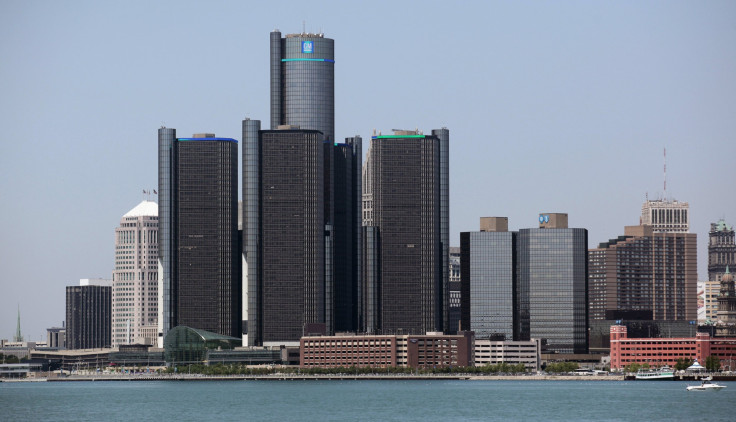Detroit Is Days, Even Hours, Away From A Bankruptcy Filing In What Would Be The Largest Municipal Bankruptcy Filing Since Cleveland's 1978 Filing: Report

UPDATE: 4:38 p.m. EDT: Detroit filed for bankruptcy protection on Thursday, becoming the first major U.S. city to file for protection from its creditors in 35 years. The once-proud municipality, known affectionately as the "Motor City" because it was home to General Motors Company (NYSE:GM), Ford Motor Company (NYSE:F) and Chrysler, sought the federal court's protection as it struggled unsuccessfully to get out from under billions in debt. The court filing is the largest such action in the nation's history.
Original story begins here:
Detroit’s state-appointed emergency manager, who has been unsuccessful in restructuring some $11 billion of the city’s $18.5 billion in debt from unsecured creditors, is finalizing a bankruptcy filing that could come as soon as Friday morning, according to the Detroit Free Press.
Such a filing, which would seek to protect Detroit from claims by lenders and the city’s unions, would begin a 30- to 90-day period during which the Justice Department would determine if the city qualifies for Chapter 9 protection, and, if so, identify qualified claimants.
The last time a large U.S. city filed for bankruptcy was Cleveland in 1978, when Dennis Kucinich was mayor.
Prospects for a bankruptcy filing jumped Wednesday when the city's two pension funds, the General Retirement System and the Police and Fire Retirement System, sued state-appointed emergency manager Kevyn Orr and Gov. Rick Snyder to stop any cuts in pension benefits. The suit by the two funds, which represent more than 30,000 people, resembles two lawsuits filed earlier this month by groups of city workers and retirees, the Detroit Free Press said.
A judge has scheduled a hearing on the suit by the two funds for Monday, making a bankruptcy filing before that probable.
In mid-June, Orr asked creditors to accept pennies on their dollars to keep the city out of bankruptcy. At the time, Orr presented a plan to creditors that envisions spending $1.25 billion on blight removal and public safety initiatives, yet he is also directing the city to stop payments on $2 billion in unsecured debt (Detroit has about $17 billion in liabilities).
But his efforts are not succeeding.
“Pension boards, insurers, it’s clear that if you’re suing us, your response is ‘no,’” said Bill Nowling, Orr’s spokesman. “We still have other creditors we continue to have meetings with, other stakeholders who are trying to find a solution here, because they recognize that, at the end of the day, we have to have a city that can provide basic services to its 700,000 residents.”
Detroit has contemplated drastic measures and is near the limit of its ability to raise money via taxes to pay back lenders. The city’s population has plunged 60 percent from its population of 2 million in the 1950s to just under 700,000 now, a drop that has cut tax revenue by 40 percent since 2000.
Investors have been getting nervous about the city’s financial viability for years. Detroit’s last five bond offerings have been done on a secured basis, and its debt securities that were not secured by pledges of revenue streams or collateral have carried relatively big coupons, implying a consensus that such securities were not very secure.
Credit ratings on Detroit’s unlimited-tax general-obligation bonds have been falling for years and, under Moody’s rankings, now occupy the third lowest level in that agency’s 21 levels of quality.
The plan includes transferring authority for the city’s water and sewage department to regional officials, cutting pensioner’s benefits, slashing 99.6 percent of current public health care offerings and ceasing some debt payments. The proposal also says Detroit should rely on the state of Michigan to deal with Detroit’s abandoned properties and blight.
Meeting with investors, Orr described the plan as bold, saying "aggressive action is required to get Detroit back on its feet and improve the quality of life for people who call Detroit home,” according to the Free Press. “Detroit’s road to recovery begins today.”
Many of Orr’s proposals are and will be highly controversial. Late last month, Orr proposed selling off several priceless works of art from the Detroit Institute of Arts in order to satisfy creditors -- a sale that could fetch “several billion dollars,” Deadline Detroit reports. Orr’s proposal was met with a severe backlash from the art community in Michigan.
Another earlier proposal put forward by Michigan to help Detroit’s finances involved the state purchasing Belle Isle in the Detroit River and turning it into a state park to take its management and upkeep off the city’s hands. It was struck dead by the Detroit City Council.
Despite the opportunity for knee-jerk uproar, especially among the retirement community, over the proposed of slashing benefits, pension officials said in a statement on Friday that they will help with Orr’s efforts “in a cooperative manner and with an open dialog.”
“For many, these pensions are all they have," the statement said. "They provided valuable service to the city and many live in the city.”
In another spot of bad news, Standard & Poor’s yesterday revised the outlook on several of Detroit’s bonds on Thursday from stable to negative. "The negative outlook reflects additional risks that the system may not be able to generate net revenues that provide more than 1x coverage on all annual debt service and pension obligation costs,” S&P said in a statement. “The city of Detroit is still in the midst of severe economic stress. At the current rating level, we would expect that net revenues would remain at least 1x the system's fixed costs.”
© Copyright IBTimes 2024. All rights reserved.





















